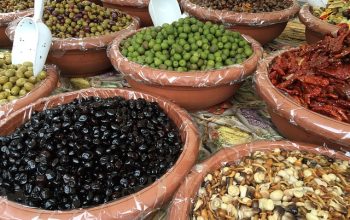Local food delivery services have revolutionized senior meal programs by offering personalized, fresh, and locally-sourced meal options tailored to individual dietary needs and preferences. These services not only enhance the independence and well-being of seniors but also strengthen community ties and support sustainable agriculture. By partnering with local organizations and nutritionists, these deliveries ensure that meals align with dietary guidelines, making them particularly beneficial for seniors with health concerns or dietary restrictions. Additionally, Community-Supported Agriculture (CSA) programs have been adapted to include seniors, providing direct access to fresh, seasonal produce through a subscription model. This integration of CSA's with local food delivery services offers a sustainable and convenient solution for elderly individuals, combining the benefits of personalized meal preparation with the convenience of modern digital platforms. The evolution of these services has led to advanced meal planning algorithms that cater to diverse culinary tastes while maintaining high nutritional standards. Local food delivery and meal preparation initiatives have thus become key components in modern senior care, ensuring a healthy and enjoyable dining experience for older adults, while also promoting economic resilience and environmental sustainability within the community.
local food delivery services are transforming meal preparation for seniors, offering nutritious and tailored dining options that empower them to maintain healthier lifestyles while fostering community connections. This article explores the pivotal role of these services in enhancing senior meal programs, the synergies created through Community-Supported Agriculture (CSA) partnerships, and the innovations driving adaptive food delivery solutions that cater to diverse dietary needs. Join us as we delve into how local food delivery is redefining senior nutrition and community engagement.
- Empowering Seniors with Nutritious Choices: The Role of Local Food Delivery in Meal Programs
- Community-Supported Agriculture (CSA) and Senior Meal Delivery: A Mutually Beneficial Partnership
- Innovations in Senior Meal Preparation: Adapting Local Food Delivery Services to Dietary Needs
Empowering Seniors with Nutritious Choices: The Role of Local Food Delivery in Meal Programs

Local food delivery services have become a vital resource for senior meal programs, offering a lifeline to those who may face challenges in preparing nutritious meals consistently. These services not only provide seniors with access to fresh, locally-sourced ingredients but also cater to specific dietary needs and preferences. The empowerment that comes from having personalized meal choices delivered directly to one’s doorstep cannot be overstated. It allows seniors to maintain their independence while ensuring they receive the necessary nutrients to support their health. Moreover, local food delivery services often partner with community organizations and nutritionists to tailor meals according to dietary guidelines, which is particularly beneficial for seniors who require specialized diets due to medical conditions or lifestyle choices. By fostering a direct connection between producers and consumers, these programs also support the local economy and promote sustainable agricultural practices. This symbiotic relationship ensures that seniors receive high-quality, nourishing meals while simultaneously encouraging community engagement and economic vitality within the local food ecosystem.
Community-Supported Agriculture (CSA) and Senior Meal Delivery: A Mutually Beneficial Partnership

Community-Supported Agriculture (CSA) programs have long been a cornerstone for providing fresh, local produce directly to consumers. These programs offer a subscription model where members receive shares of the harvest from local farms, fostering a direct relationship between eaters and farmers. With the advent of digital platforms, CSA’s have expanded their reach, making it possible for senior citizens to partake in this farm-to-table experience through local food delivery services. This partnership not only ensures that seniors have access to nutritious meals but also supports the local agricultural economy.
Senior meal delivery services, often tailored to dietary needs and preferences, can integrate CSA offerings into their meal preparation schedules. This synergy means that seniors benefit from a diverse range of seasonal produce, while farmers gain a consistent market for their crops. The convenience of having meals prepared and delivered to one’s doorstep, coupled with the assurance of receiving fresh, local ingredients, addresses several nutritional and social challenges faced by older adults. By fostering this mutually beneficial partnership, communities can enhance the well-being of their senior members while promoting sustainable agriculture practices. This dual advantage makes CSA-based meal delivery programs a compelling option for seniors looking to maintain a healthy and diverse diet without the complexities of shopping, cooking, or transportation.
Innovations in Senior Meal Preparation: Adapting Local Food Delivery Services to Dietary Needs

The integration of local food delivery services into senior meal preparation has seen significant advancements, addressing the unique dietary needs and preferences of older adults. These innovations are tailored to ensure that seniors receive nutritious and flavorful meals tailored to their health requirements, which often include considerations for digestive sensitivity, allergies, and specific nutritional guidelines. By partnering with local farmers and producers, these services can offer fresh, seasonal ingredients that not only promote healthy eating but also support the local economy. The use of technology has been pivotal in customizing meal options, allowing seniors to select their preferred dishes through user-friendly platforms, which then communicate directly with kitchen staff and delivery personnel. This ensures that each meal is prepared according to individual dietary restrictions and delivered promptly, maintaining the integrity and quality of the food. The adaptability of local food delivery services in accommodating special diets has made them an increasingly popular solution for ensuring that seniors have access to wholesome and satisfying meals right at their doorsteps.
Furthermore, the collaboration between meal preparation experts and local food delivery providers has led to the development of innovative meal planning algorithms. These sophisticated systems consider not only nutritional values but also flavor profiles and the culinary preferences of seniors. The result is a diverse menu that caters to a wide range of tastes, from classic comfort foods to international cuisines, all while maintaining alignment with dietary prescriptions. The local nature of these services ensures that meals are not only personalized but also made from fresh, high-quality ingredients, which can have a positive impact on the overall health and wellbeing of seniors. With ongoing improvements in logistics and meal customization, local food delivery programs are setting new standards for senior meal preparation, making it an essential component of modern healthcare and community support initiatives.
Local food delivery programs have emerged as a pivotal resource for seniors, offering not just nutritious meals but also fostering community connections and supporting local agriculture through innovative partnerships. The integration of Community-Supported Agriculture (CSA) with senior meal services has proven to be mutually advantageous, ensuring that seniors receive fresh, seasonal produce while providing financial support and market expansion for local farmers. Additionally, the adaptations made in meal preparation cater specifically to dietary needs and preferences, enhancing the overall well-being of older adults. These programs underscore the importance of sustainable and accessible food delivery systems in promoting health and autonomy among seniors. As these initiatives continue to evolve, they stand to redefine how communities care for their eldest members, making local food delivery a cornerstone in meal preparation for this demographic.




